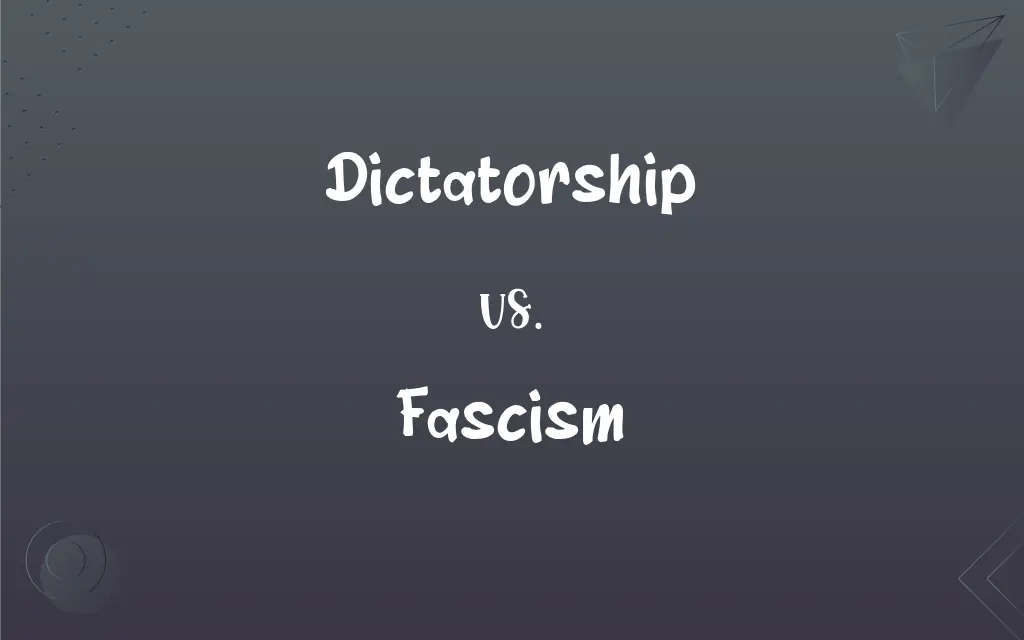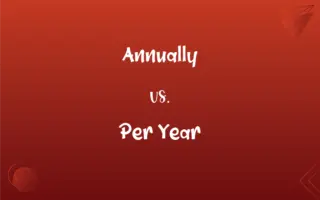Dictatorship vs. Fascism: What's the Difference?
Edited by Harlon Moss || By Janet White || Published on January 20, 2024
Dictatorship is a form of government where power is centralized in a single person or group, while fascism is a specific political ideology that combines dictatorial power with extreme nationalism and often racism.

Key Differences
A dictatorship is a governance system where absolute power is vested in a single individual or a small group, often characterized by authoritarian rule and limited political freedoms. Fascism, on the other hand, is a specific type of dictatorship characterized by extreme nationalist ideologies, often coupled with racism and militarism, where power is also centralized in a leader or a party.
In dictatorship, the focus is on the concentration of power and the suppression of opposition, which can exist in various ideological frameworks. Fascism, distinctively, promotes a totalitarian state with a strong emphasis on ethnic identity and the purity of the nation, often leading to aggressive policies both internally and externally.
The economic systems in dictatorships can vary, ranging from capitalism to socialism, depending on the ruler's preferences. Fascism, however, often incorporates elements of corporatism, seeking to create a harmonious relationship between government, businesses, and labor, but under strict state control.
Propaganda is a common tool in both systems, but in fascism, it is more specifically used to foster a cult of personality around the leader and to promote the state's ideologies of superiority and nationalism. In dictatorships, propaganda may be more broadly focused on legitimizing the ruler's power and suppressing dissent.
All fascist regimes are dictatorships, while not all dictatorships are fascist. Fascism represents a specific historical and ideological form of dictatorship with unique characteristics like its focus on ethnic nationalism, while dictatorships can be ideologically neutral or aligned with various political philosophies.
ADVERTISEMENT
Comparison Chart
Ideology
Can be ideologically neutral or varied
Specific ideology centered on nationalism and often racism
Power Structure
Centralized in an individual or group
Centralized, with a focus on a leader and a single party
Economic Policy
Varies widely
Often corporatist, state-controlled economy
Propaganda Use
Broadly for power legitimization
Specifically for nationalism and leader's cult
Historical Context
Can occur in any era
Specifically associated with early 20th-century Europe
ADVERTISEMENT
Dictatorship and Fascism Definitions
Dictatorship
Absolute authority in any sphere.
The company's CEO ran the business like a dictatorship, making all decisions unilaterally.
Fascism
Severe economic and social regimentation.
Fascism in the country manifested in strict control over the media and public discourse.
Dictatorship
Government by a dictator.
The country's shift to a dictatorship was marked by the suspension of democratic institutions.
Fascism
A tendency toward or actual exercise of strong autocratic or dictatorial control.
His leadership style was criticized as having elements of fascism due to its oppressiveness.
Dictatorship
Absolute, imperious, or overbearing power or control.
The teacher's dictatorship in the classroom stifled creativity.
Fascism
A political philosophy, movement, or regime that exalts nation and often race above the individual.
The rise of fascism in the 1930s led to devastating global conflicts.
Dictatorship
A state ruled by a dictator.
After the coup, the nation became a dictatorship under the general's command.
Fascism
Forcible suppression of opposition.
Under fascism, any form of political dissent was swiftly and brutally silenced.
Dictatorship
Autocratic rule, control, or leadership.
Her dictatorship over the committee prevented any meaningful debate.
Fascism
A centralized autocratic government headed by a dictatorial leader.
The novel depicted a dystopian future dominated by fascism.
Dictatorship
The office or tenure of a dictator.
Fascism
A system of government marked by centralization of authority under a dictator, a capitalist economy subject to stringent governmental controls, violent suppression of the opposition, and typically a policy of belligerent nationalism and racism.
Dictatorship
A state or government under dictatorial rule.
Fascism
A political philosophy or movement based on or advocating such a system of government.
Dictatorship
Absolute or despotic control or power.
Dictatorship
A type of government where absolute sovereignty is allotted to an individual or a small clique.
Dictatorship
A government which exercises autocratic rule.
Dictatorship
Any household, institution, or other organization that is run under such sovereignty or autocracy.
Dictatorship
The office, or the term of office, of a dictator; hence, absolute power.
Dictatorship
A form of government in which the ruler is an absolute dictator (not restricted by a constitution or laws or opposition etc.)
FAQs
What is a dictatorship?
A form of government where power is centralized in a single individual or a small group.
What characterizes fascism?
Fascism is characterized by extreme nationalism, often coupled with racism, and centralized, dictatorial power.
How do dictatorships maintain power?
Through control of the military, suppression of dissent, propaganda, and sometimes charisma or ideology.
What role does propaganda play in fascism?
Propaganda in fascism promotes the state's ideology, national superiority, and the leader's cult of personality.
Can dictatorships have different ideologies?
Yes, dictatorships can be aligned with various ideologies, from right-wing to left-wing.
Can a dictatorship be democratic?
No, dictatorships are inherently undemocratic as they concentrate power in one ruler or group, bypassing democratic processes.
Are all dictatorships fascist?
No, not all dictatorships are fascist; fascism is a specific form of dictatorship with unique characteristics.
Is fascism always racist?
While not always explicitly racist, fascism often includes elements of racial superiority and ethnocentrism.
What happens to political freedoms under fascism?
Political freedoms are severely restricted or eliminated under fascism.
Can fascism exist in a multi-party system?
Fascism usually exists in a single-party system where the fascist party controls the state.
What is the role of the leader in fascism?
The leader in fascism is often viewed as a symbol of national strength and unity, having near-absolute power.
Can dictatorships be stable?
While they can be stable for a time, dictatorships often face internal and external challenges due to their oppressive nature.
Can dictatorships evolve into democracies?
Yes, through reforms or revolutions, dictatorships can transition to more democratic forms of government.
How does fascism impact the economy?
Fascism often leads to a state-controlled, corporatist economy, where business interests are aligned with government objectives.
How do dictatorships control the media?
By censorship, state ownership, or intimidation, ensuring only state-approved information is disseminated.
How do fascist regimes treat opposition?
They typically suppress opposition through force, censorship, and political repression.
What is the international response to fascism?
Fascist regimes often face international condemnation, sanctions, and sometimes military intervention.
What leads to the rise of dictatorships?
Factors like political instability, economic crises, or social unrest can lead to the rise of dictatorships.
How do dictatorships affect human rights?
Dictatorships often violate human rights through oppression, censorship, and lack of political freedom.
What is corporatism in fascism?
Corporatism in fascism refers to the state's control and integration of economic sectors for national interests.
About Author
Written by
Janet WhiteJanet White has been an esteemed writer and blogger for Difference Wiki. Holding a Master's degree in Science and Medical Journalism from the prestigious Boston University, she has consistently demonstrated her expertise and passion for her field. When she's not immersed in her work, Janet relishes her time exercising, delving into a good book, and cherishing moments with friends and family.
Edited by
Harlon MossHarlon is a seasoned quality moderator and accomplished content writer for Difference Wiki. An alumnus of the prestigious University of California, he earned his degree in Computer Science. Leveraging his academic background, Harlon brings a meticulous and informed perspective to his work, ensuring content accuracy and excellence.






































































